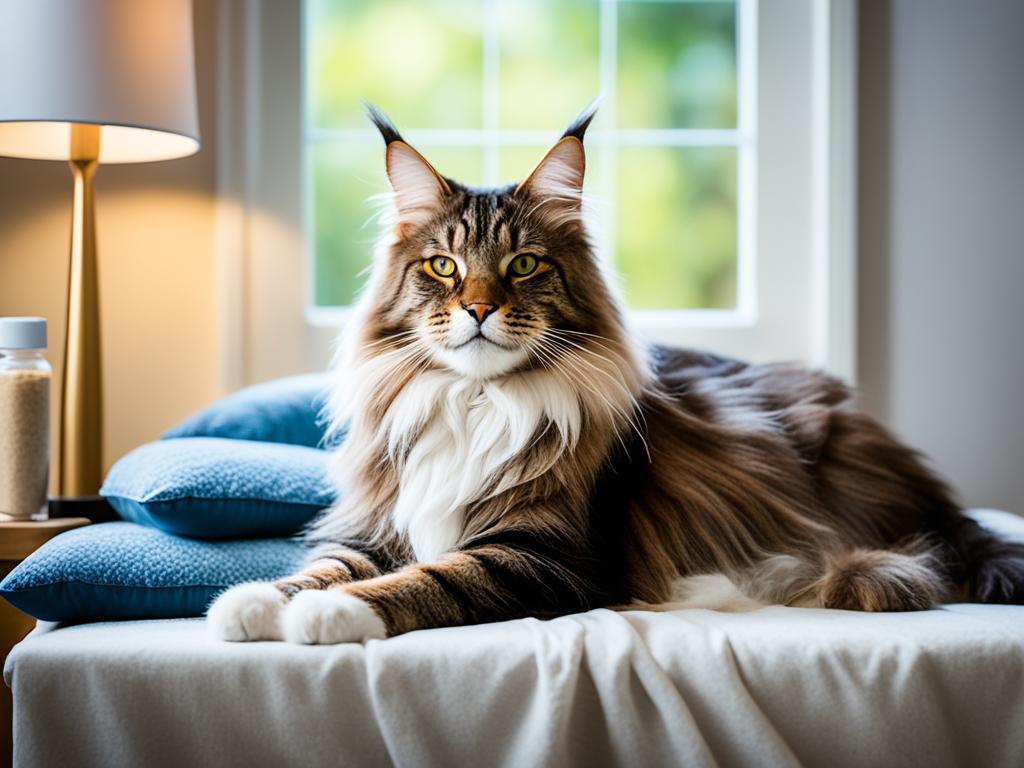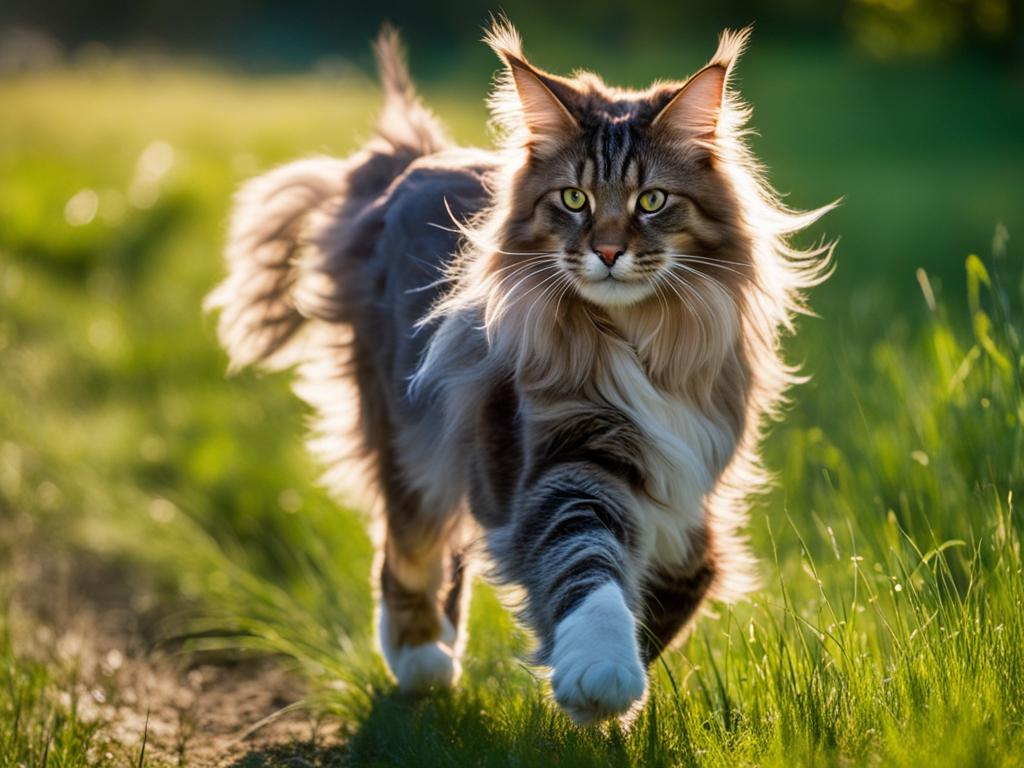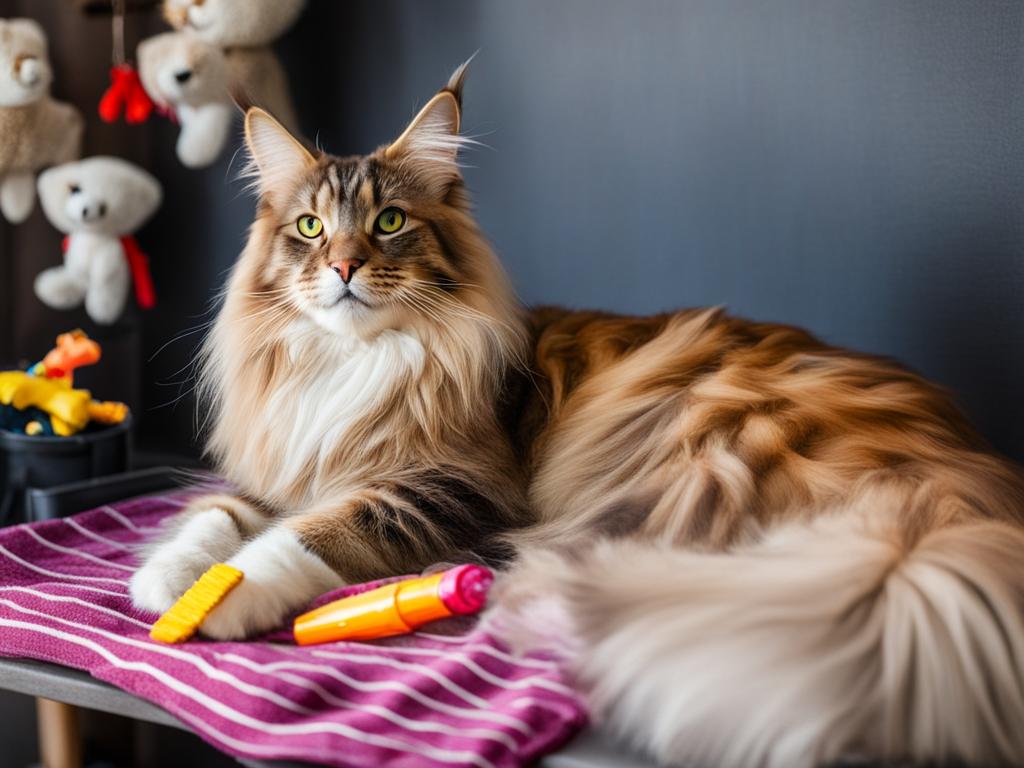As your beloved Maine Coon cat enters its golden years, it’s crucial to provide them with the specialized care they need to maintain their health and happiness. Age-related changes can impact their overall well-being, making it important for owners to be proactive in ensuring their senior Maine Coon receives proper care.
Senior Maine Coons require specific attention and tailored care to address the challenges that come with aging. By understanding common health problems, implementing a suitable diet and exercise routine, and providing essential grooming and medical care, you can prolong their lifespan and enhance their quality of life.
Key Takeaways:
- Senior Maine Coons require specialized care to address age-related changes.
- Understanding common health problems in senior Maine Coons is crucial for proper care.
- A suitable diet and exercise routine play a crucial role in the well-being of senior Maine Coons.
- Grooming and regular medical care are essential for maintaining the health of senior Maine Coons.
- Providing a comfortable and safe environment contributes to the happiness and health of senior Maine Coons.
Common Health Problems in Senior Maine Coons
As senior Maine Coons age, they may be prone to various health issues that can affect their overall well-being. Understanding and addressing these common health problems is crucial for providing them with the care they need.
Arthritis
Arthritis is a common condition in senior cats, including Maine Coons. It causes stiffness, discomfort, and reduced mobility in their joints. By recognizing the signs of arthritis, such as difficulty jumping or climbing stairs, owners can provide appropriate care and relief for their furry companions.
Kidney Problems
Kidney problems, such as chronic kidney disease, can affect senior Maine Coons. These conditions can lead to increased drinking and urination, weight loss, and decreased appetite. It’s important to monitor their hydration levels and consult with a veterinarian for proper management.
Gingivitis
Gingivitis, or inflammation of the gums, is a common dental problem in senior cats. It can cause discomfort and lead to more serious dental issues if left untreated. Regular dental care, including brushing their teeth and professional cleanings, is essential for maintaining their oral health.
Vision and Hearing Loss
As Maine Coons age, they may experience vision and hearing loss. Owners may notice them bumping into objects or being less responsive to sounds. Providing a safe and familiar environment, along with regular check-ups with a veterinarian, can help manage these changes.
Skin and Coat Changes
Senior Maine Coons may experience changes in their skin and coat as a result of aging. Their coat may become thinner, duller, or develop mats more easily. Regular grooming, including brushing and bathing, along with a balanced diet and supplements if recommended by a veterinarian, can help maintain the health of their skin and coat.
Senility
Just like humans, senior cats, including Maine Coons, can experience cognitive decline or senility. They may show signs such as disorientation, confusion, and changes in behavior. Providing mental stimulation, a consistent routine, and a safe environment can help support their cognitive health.
Understanding these common health problems in senior Maine Coons allows owners to be proactive in their care. By recognizing the signs and symptoms, seeking veterinary advice, and implementing appropriate lifestyle changes, owners can help their beloved companions live a comfortable and healthy life in their golden years.
Tips for Managing Health Problems
Managing health problems in senior Maine Coons involves specific care strategies. Here are some tips to address common issues:
Arthritis Treatment
Arthritis is a common issue in senior cats, causing stiffness and discomfort. To provide relief, consider:
- Using supplements like chondroitin and glucosamine
- Ensuring regular exercise to keep joints mobile
Kidney Problem Treatment
Kidney problems require careful management. Consult your veterinarian for:
- Appropriate medications
- Diet changes to support kidney health
- Fluid administration if necessary
Dental Care
Gingivitis is a common issue in senior cats. Maintain your cat’s dental health with:
- Regular brushing or professional cleanings
- Using dental hygiene products designed for cats
Vision and Hearing Loss
Vision and hearing loss can affect senior cats. If you notice these changes, consider the following:
- Providing a safe environment for your cat
- Minimizing sudden changes in their surroundings
- Considering toys and activities that stimulate their other senses
Skin and Coat Care
Senior cats may experience changes in their skin and coat. Maintain their coat health with:
- Regular grooming sessions to prevent matting
- Supplementing their diet with fatty acids for skin health
Managing Senility
Senility can affect senior cats, leading to confusion and disorientation. Help manage their condition by:
- Engaging in mentally stimulating activities
- Creating a routine and safe environment

| Health Problem | Treatment Options |
|---|---|
| Arthritis | Chondroitin and glucosamine supplements, regular exercise |
| Kidney Problems | Medications, diet changes, fluid administration |
| Dental Care | Regular brushing, dental hygiene products for cats |
| Vision and Hearing Loss | Provide a safe environment, minimize sudden changes, stimulate other senses |
| Skin and Coat Care | Regular grooming, fatty acid supplements in diet |
| Managing Senility | Mentally stimulating activities, routine, safe environment |
Diet and Exercise for Senior Maine Coons
Proper diet and exercise are essential for maintaining the health and well-being of senior Maine Coons. As cats age, their metabolism changes, and it becomes crucial to adjust their diet to help them maintain a healthy weight.
Feeding senior Maine Coons high-quality cat food specifically formulated for their needs can provide them with the necessary nutrients while preventing weight gain. These specialized cat foods are designed to support the aging process, ensuring that your senior Maine Coon receives the right balance of vitamins, minerals, and proteins.
Regular exercise is also important for senior cats to help them stay active and agile. Engaging in playtime activities and providing interactive toys can keep your senior Maine Coon physically and mentally stimulated. It also helps prevent weight gain and supports their overall fitness and mobility.
To further maintain weight in senior cats, it’s important to monitor their food intake and adjust portion sizes accordingly. Overfeeding can lead to weight gain, while underfeeding can result in malnutrition. Consulting your veterinarian for guidance on portion control and feeding schedules can help ensure your senior Maine Coon maintains a healthy weight.
Benefits of Senior Cat Diet and Exercise
A senior cat diet and exercise routine offer several benefits for your beloved Maine Coon:
- Weight Management: A balanced diet and regular exercise help prevent obesity, which can contribute to various health problems in senior cats.
- Joint Health: Exercise helps keep their joints supple and reduces the risk of arthritis or relieves its symptoms.
- Mental Stimulation: Playtime activities and interactive toys provide mental stimulation, preventing boredom and promoting overall well-being.
- Cardiovascular Health: Regular exercise supports a healthy heart and circulatory system in senior cats.
By implementing a proper diet and exercise routine, you can help your senior Maine Coon maintain their ideal weight, stay active, and enjoy a higher quality of life in their golden years.
| Senior Cat Diet Tips | Senior Cat Exercise Tips |
|---|---|
| 1. Choose high-quality cat food specifically formulated for senior cats. | 1. Engage in interactive playtime activities with your senior Maine Coon. |
| 2. Monitor food intake and adjust portion sizes to maintain a healthy weight. | 2. Provide stimulating toys that encourage physical activity and mental engagement. |
| 3. Consult your veterinarian for guidance on feeding schedules and portion control. | 3. Incorporate regular exercise into your senior Maine Coon’s daily routine. |

Grooming and Care for Senior Maine Coons
Grooming plays a vital role in maintaining the health and well-being of senior Maine Coon cats. Their long, luxurious coat requires regular attention to prevent matting and excessive shedding. To keep their coat smooth and tangle-free, it is recommended to use a metal comb or slicker brush during grooming sessions.
In addition to coat care, maintaining good dental hygiene is crucial for senior cats. Regular brushing with a cat-specific toothbrush and toothpaste can help prevent oral health issues such as gum disease and tooth decay. Checking for any lumps, bumps, or abnormalities on the skin during grooming sessions is also important in detecting any potential health concerns early on.
Observing changes in the cat’s appearance and behavior is vital for their overall well-being. As cats age, they may experience changes in weight, appetite, mobility, or energy levels. Taking note of these changes and seeking veterinary advice if necessary can help address any underlying issues promptly.
Creating a comfortable and safe environment for senior Maine Coons is also essential. Providing soft bedding, easy access to litter boxes, and placing food and water bowls at an appropriate height can help make their daily grooming routine more comfortable. Meeting their specific needs and showering them with love and attention will contribute to their happiness and health in their golden years.
FAQ
What are some common health problems in senior Maine Coons?
Common health problems in senior Maine Coons include arthritis, kidney problems, gingivitis, vision and hearing loss, skin and coat changes, and senility.
How can I manage arthritis in my senior Maine Coon?
You can manage arthritis in your senior Maine Coon by providing relief through supplements like chondroitin and glucosamine and ensuring regular exercise.
What can I do to manage kidney problems in my senior Maine Coon?
Managing kidney problems in your senior Maine Coon may involve medications, diet changes, and fluid administration. Consult with your veterinarian for appropriate treatment.
How can I ensure proper dental care for my senior Maine Coon with gingivitis?
Regular dental care, including brushing their teeth and providing dental treats or toys, can help maintain good oral hygiene for your senior Maine Coon with gingivitis.
What should I do if my senior Maine Coon experiences vision and hearing loss?
If your senior Maine Coon experiences vision and hearing loss, it’s important to provide a safe and familiar environment and consult with your veterinarian for guidance.
How can I maintain the skin and coat health of my senior Maine Coon?
Regular grooming, including brushing their coat and providing fatty acid supplements, can help maintain the skin and coat health of your senior Maine Coon.
What can I do to manage senility in my senior Maine Coon?
Engaging in mentally stimulating activities, providing a routine, and ensuring a comfortable environment can help manage senility in your senior Maine Coon.
How should I adjust the diet and exercise of my senior Maine Coon?
As cats age, their metabolism changes. Consult with your veterinarian to determine the appropriate diet and exercise plan to maintain a healthy weight for your senior Maine Coon.
How often should I groom my senior Maine Coon?
Regular grooming is important for senior Maine Coons. Brush their coat at least once a week to prevent matting and excessive shedding.
How can I maintain the overall well-being of my senior Maine Coon?
Along with proper diet, exercise, and grooming, it’s important to provide a comfortable and safe environment and monitor any changes in their appearance and behavior.

Leave a Reply